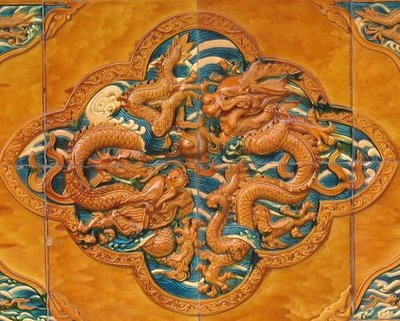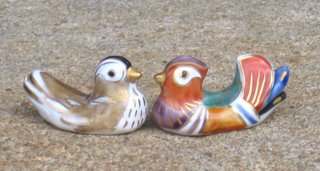:::::::::::::::::::::::::::::::::::::::::::::::::::::::::::::::::::::::::::::::::::::::::::::::::::::
observance kigo for mid-summer
tenshi o egaku 天師を画く
painting the heavenly master
This refers to the custom of making a painting of Chooryoo 張陵 Choryo, Zhang Daoling, the founder of the Daoist movement
Gotoheidoo (Gotomaido) 五斗米道 "Way of the Five Pecks of Rice" .
The painting was sent to the disciples and kept as an amulet to ward off evil.
Tenshidoo 天師道 "Way of the Celestial Masters"
Choodooryoo 張道陵 Zhang Daoling
Eastern Han Dynasty Taoist hermit who founded the Way of the Celestial Masters sect of Taoism, which is also known as the Way of the Five Pecks of Rice.
Celestial Master Zhang (張天師), Ancestral Celestial Master (祖天師) or Zhengyi Zhenren (正一真人) to Taoists.
... Zhang died on Mount Qingcheng in 156 during the reign of Emperor Huan of Han at the age of 123.

© More in the WIKIPEDIA !
. Zooka 造化 the creative force .
zooka, zouka, zōka - zoka
. Abe no Seimei 阿倍晴明 .
Onmyodo, onmyoodoo 陰陽道 The Way of Yin and Yang
. Yin and Yang 陰陽 and my cats .
. Chinese origin of Japanese kigo .
. ZEN and Haiku ... well, well, well .
:::::::::::::::::::::::::::::::::::::::::::::::::::::::::::::::::::::::::::::::::::::::::::::::::::::
Taoism (Daoism)
is a philosophical and religious tradition that emphasizes living in harmony with the Tao (romanized as "Dao").
The term Tao means "way", "path" or "principle", and can also be found in Chinese philosophies and religions other than Taoism. In Taoism, however, Tao denotes something that is both the source and the driving force behind everything that exists. It is ultimately ineffable: "The Tao that can be told is not the eternal Tao."
© More in the WIKIPEDIA !
:::::::::::::::::::::::::::::::::::::::::::::::::::::::::::::::::::::::::::::::::::::::::::::::::::::
QUOTE
As long as the sun rises
And your heart beats,
Tao is at hand.
People think that Tao can only be known through fairy-tale stories of old men in the mountains or obscure poetry about gods riding dragons. Other declare that elaborate ritual, frightening talismans, and mumblings from the depths of spirit possession are necessary for understanding. This simply not true.
Why put another’s experience before your own? Tao is in each of us. Admittedly, an individual’s common ignorance usually obscures awareness of Tao, but this does not mean that there is no Tao or that it is not important.
Tao is there for us to experience any time that we can open ourselves to it.
Is the sun shining? Does night follow day?
Is the sky blue? Do you have feeling?
Then it is possible to know Tao directly and immediately.
Don’t delay, don’t think yourself too insignificant.
Feel for it. Right now.
As long as you are alive, Tao is right at hand !
............................................
Now, replace TAO with HAIKU and read the text again !
Haiku is right at hand !
Qoute taken from here, with a picture, Lisbeth West:
http://www.duckdaotsu.org/06/accessibility.html
:::::::::::::::::::::::::::::::::::::::::::::::::::::::::::::::::::::::::::::::::::::::::::::::::::::
the mirror-like mind
reflects what is -
haiku of the seasons
READ : Taoism, the concept of Ziran
:::::::::::::::::::::::::::::::::::::::::::::::::::::::::::::::::::::::::::::::::::::::::::::::::::::
QUOTE
About Nondoing (wu-wei)
The nondoing (wu-wei) concept is one of the most important for Taoist philosophy. Its importance results from the fact that it is directly connected to an essential idea of the philosophical Taoism: the adjustment to the demands of time, to changes. The whole metaphysics of the ancient philosophical Taoism is focused on this point, which, let's make a clear breast, doesn't include anything metaphysical!
From this follows the pragmatism of the Chinese philosophy which represents the object of our study from this site. (Chinese people also had the knowledge of speculation, mystic, magic - the way they are nowadays in vogue in the modern world - but we are not interested here by these aspects.)
Nondoing at Alan Watts
The apparently best explanations of the term nondoing we find again at Alan Watts. Just a few quotes from this prolific author:
[...] The principle of 'nonaction' (wu-wei) is not to be considered inertia, laziness, laissez-faire or mere passivity.
Thus, wu-wei as "not forcing" is what we mean by going with the grain, rolling with the punch, swimming with the current, trimming sails to the wind, taking the tide at its flood, and stooping to conquer.
Wu-wei is thus the life-style of one who follows the Tao, and must be understood primarily as a form of intelligence - that is of knowing the principles, structures, and trends of human and natural affairs so well that one uses the least amount of energy in dealing with them. (1)
Unfortunately, despite the undeniable seduction of such explanations, they are still incomplete. Because nondoing is not a method that can be applied in any circumstance, as Watts' lines seem to indicate.
Usually, nondoing has to be connected with doing, if we want to follow the Taoist logic. The adjustment to the demands of time, as I have already mentioned, has the exigency of a sort of behavioral flexibility that does not remain stuck in its position, but emulates the requirements of the moment. Thus, at the same time, one may have to bend over in order to succeed, or, on the contrary, to remain firm in order to win.
Nondoing in I-ching
We can find many examples in this respect in the old Taoist literature. For instance, in I-ching, hexagram no 25 - Innocence (the Unexpected) - the second line, we find that if our doing is according to the requirements of time, it will be successful even if we do not explicitly target success. In other words, it is not necessary to push for the results of an action if it is performed in due time. After all, it is like doing nothing, or like having the feeling that "everything goes smoothly".
Wilhelm's comments to the entire hexagram show that the spontaneous, instinctive action is not always suitable. The action has to be according to the Heaven in order to have the chance of success.
Nondoing at Lao-tzu
Lao-tzu himself is not an unconditional adept of nondoing if we take into account the historical fact that he held an official position at the sovereign's court. Later on, he left his work and withdrew from the mundane world, but not because he followed the principles of a fully spiritual lifestyle, but because he was disgusted with the decay of the morality at the court.
Lao-tzu's reaction confirms in fact what I have said above: nondoing (here in the sense of withdrawal from the public life) has to be according to the requirements of time and not an absolute principle of life.
So, nondoing should be regarded as a complement of doing and not as a virtue or as an absolute model of life!
This aspect is ignored in its manifest feature by Alan Watts, and not only by him. Max Kaltenmark, one of the most well known Taoist experts, is also far from this obvious thing. Not to mention Ssu-ma Ch'ien himself, the historian of the Chinese classicism, who also limits Taoism (Lao-tzu's philosophy) to the ideas of seclusion from public life, of monastic life, and so forth.
Notes:
1. From Alan Watts: "Tao: The Watercourse-Way", Pantheon Books, 1975.
2. The original text of the line states that:
If one does not count on the harvest while plowing,
Nor on the use of the ground while clearing it,
It furthers one to undertake something.
Here's the Wilhelm's commentary:
We should do every task for its own sake as time and place demand and not with an eye to the result. Then each task turns out well, and anything we undertake succeeds. Paper by Jhian Yang
Copyright 1999-2006, Way of Perfect Emptiness.
http://www.taopage.org/nondoing.html
Rooshi 老子 老荘 Lao-tzu, Lao-Tsu, Laozi Li Erh
Tao Te Ching, Dao De Jing, or Daodejing (道德經)
Dootokukyoo 道徳経
© More in the WIKIPEDIA !
... ... ... ...
The Praying Mantiss and Wu Wei
It is indeed difficult to know when to interfere and when not, the Chinese WU WEI is one way of teaching us.
Happy Haiku Forum, Gabi Greve
More in the Happy Haiku Forum
. WKD : Laozi, Lao-tzu, Rooshi, Roshi【老子】 .
:::::::::::::::::::::::::::::::::::::::::::::::::::::::::::::::::::::::::::::::::::::::::::::::::::::
winter with Tao <>
to write haiku
without words
true words aren't beautiful
Read it all HERE !
:::::::::::::::::::::::::::::::::::::::::::::::::::::::::::::::::::::::::::::::::::::::::::::::::::::
Knowing others is intelligence;
knowing yourself is true wisdom.
Mastering others is strength;
mastering yourself is true power.
If you realize that you have enough,
you are truly rich.
from the Tao Te Ching
............................................
if you have enough
you have enough
to write haiku
:::::::::::::::::::::::::::::::::::::::::::::::::::::::::::::::::::::::::::::::::::::::::::::::::::::

More of my TAO / DAO Quotes
The ego is a monkey catapulting through the jungle.
Division is contrary to the nature of the Tao.
words have an ancestor
An ocean of ink in a single drop
One gives birth to two: meaning of numbers
Please find more quotes HERE !
:::::::::::::::::::::::::::::::::::::::::::::::::::::::::::::::::::::::::::::::::::::::::::::::::::::
Taoism is the mirror of life

Taoism is not somebody's invention, Lao-tzu's or Chuang-tzu's.
It is not something instantly made up by somebody's mind - by a sage or a
philosopher.
Taoism is the mirror of life, life as it is reflected in the human mind.
source : www.taopage.org
:::::::::::::::::::::::::::::::::::::::::::::::::::::::::::::::::::::::::::::::::::::::::::::::::::::
Daoist Studies Website
http://www.daoiststudies.org/
PMJS : Daoism in Japan
More of my . LINKS . my links about Daoism.
PHOTO: Dragon Stone from a Garden in Shanghai.
My Shanghai Travelogue 1994
My Asian Haiku Travelogue
:::::::::::::::::::::::::::::::::::::::::::::::::::::::::::::::::::::::::::::::::::::::::::::::::::::
. Chinese origin of Japanese kigo .
[ . BACK to WORLDKIGO . TOP . ]
[ . BACK to DARUMA MUSEUM TOP . ]
:::::::::::::::::::::::::::::::::::::::::::::::::::::::::::::::::::::::::::::::::::::::::::::::::::::








1 comment:
I Ching, I-Ging 易經 / 易经 The Book of Changes
"Buch der Wandlungen“ - „Klassiker der Wandlungen“
.
Post a Comment